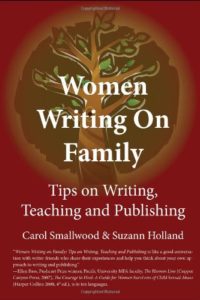 Women Writing on Family: Tips on Writing, Teaching and Publishing, edited by Carol Smallwood and Suzann Holland; and
Women Writing on Family: Tips on Writing, Teaching and Publishing, edited by Carol Smallwood and Suzann Holland; and
Teachers Act Up!: Creating Multicultural Learning Communities Through Theatre, by Melisa Cahnmann-Taylor and Mariana Souto-Manning
Review by Ivy Rutledge
In Women Writing on Family, Carol Smallwood and Suzann Holland have selected essays written by women with a variety of interests and experiences, creating a valuable guidebook. For most women, writing is a solitary practice, and this book reads like a much-needed conversation with a room full of mentors. The collection starts off with a topic geared to writers of sensitive material, which could be all of us at some point: “Family Secrets: How to Reveal What Matters Without Getting Sued, or Shunned.” In this essay, Martha Engber covers the legalities and the possible emotional fallout, and she offers ways to avoid conflict when writing nonfiction about family. There are strategies for deepening your fiction too, as Yelizaveta P. Renfro shares in her essay, “Creating the Fictional Family: No Character is an Island” (180). Renfro suggests a fun way of getting to know your characters is to think about the family graveyard; she asks questions like “Who will not be buried in the family plot?” (181). The range of advice extends all the way down the process to the business of publishing. For example, Caroline M. Grant explains the nuts and bolts of working with an editor in her essay, “From Pitch to Publication” (247). This collection covers a wide scope, and since each writer is offering information grounded in her own viewpoint, you’ll want to pick and choose the information and voices that speak to your own situation. Chances are you’ll find yourself reaching for this book frequently for inspiration and expert advice.
Women Writing on Family: Tips on Writing, Teaching and Publishing. Edited by Carol Smallwood and Suzann Holland. Toronto: The Key Publishing House, 2012. 343 pages.
In Teachers Act Up!, Cahmann-Taylor and Souto-Manning have created an important and innovative training program that brings teachers out of their classrooms—which are often isolating spaces—and offers them a safe community. There participants can deepen their understanding of the complex racial, gender, economic, and cultural differences that can lead to oppression. Grounded solidly in theory, the games are fun-filled and make the conversation around oppression more accessible. The authors clearly outline the rules of each game and include photos to illustrate the intended outcome. In acting out multiple outcomes to common situations and reflecting together on the implications, participants return to their classrooms feeling more prepared for the complex interactions they face.
These games are useful for professionals across other fields as well, especially “Rainbow of Desire,” a technique that uses the rainbow as a metaphor for the notion that “any one individual embodies multiple ‘hues’ that color our past experience and moment-to-moment communication and what we perceive as possible for future action” (112). Participants each add to a dramatic scene, exploring all of the possible influences on a person’s behavior, moving beyond what is perceived to what is hidden. This act of viewing the multiple motivations for behavior and thinking about multiple outcomes encourages practicing teachers and other professionals to move away from one-size-fits-all solutions and towards a more creative and critical approach to solving conflicts. As the authors state in their conclusion, “Through Teachers Act Up!, we learned that not having the answers is a strength, allowing teachers’ collective wisdom to come forth and unforeseen challenges to become known” (138). Both of these books work together to offer insights into a landscape that we often cross alone, and they provide the connections that we, as teachers, writers, and solitary professionals, crave.
Teachers Act Up!: Creating Multicultural Learning Communities Through Theatre. by Melisa Cahnmann-Taylor and Mariana Souto-Manning. New York: Teachers College Press, 2010. 169 pages.
Originally from Rhode Island, Ivy Rutledge lives and writes in the Piedmont of North Carolina, where she shares her life with her husband and two children. Her work has appeared in The Sun, Home Education, Ruminate, The Copperfield Review, and Tilt-a-Whirl, and she recently had a story included in the Main Street Rag anthology, Altered States.
